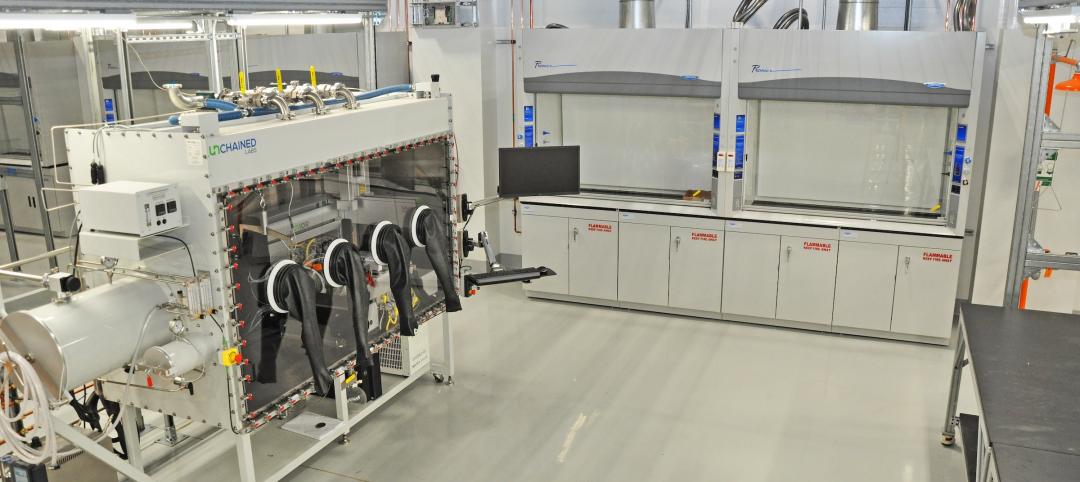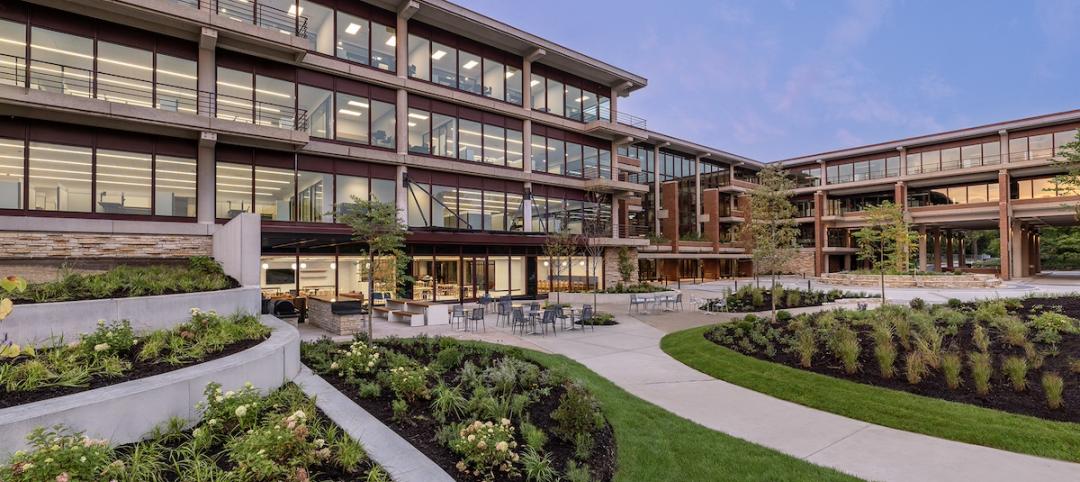Dissatisfied with the one-dimensional nature of defining energy efficiency as it relates to commercial buildings, international engineering firm Buro Happold developed a metric that links energy use to economic performance. The Building Economic Energy Coefficient (BEEC) could help many commercial building owners whose properties use a lot of energy (input), but add economic value to their cities and regions (output). This metric can also be a game changer that influences how local governments create policy to monitor the energy use of buildings.
(Download Buro Happold's white paper on the subject.)
Most systems of measurement deem a building efficient or inefficient based solely on how much energy it consumes. By contrast, BEEC measures a building’s energy use against economic performance indicators to give a more complete picture of a building’s productivity -- hence its overall efficiency. For example, a building might use less energy, but its tenants do not contribute as much to the regional economy. By this definition, another building that uses more energy might have an exponentially greater economic performance, making it more efficient.
When observed from this more comprehensive vantage point, some buildings that were previously thought of as energy hogs are revealed to be using energy more efficiently than many low-energy buildings. Buro Happold used proprietary research from CoStar Group to determine economic performance of commercial buildings in New York.
“Energy efficiency is framed in a very black-and-white way – either a building has low energy intensity or it is considered wasteful. With this research, we can now see whether or not commercial buildings are putting energy to good use. It allows us a much more nuanced and complete picture of what’s really going on with energy use,” said Steven Baumgartner, PE, CEM, HBDP, LEED AP, associate at Buro Happold, who led the research team, along with Jim Coleman and Amelia Aboff of Happold Consulting, Buro Happold’s strategic consulting arm.
City officials, building owners, and members of the AEC industry measure a building’s energy use on a per square foot, per year basis. This is known as its Energy Use Intensity (EUI). EUI is a very useful metric in determining a building’s performance but it only tells half of the story.
“Buro Happold has been a pioneer in sustainability for decades, and now we are intensively involved in the challenges of the 21st century,” said Craig Schwitter, PE, BSCE, MSCE, principal. “We are a multidisciplinary firm that brings a comprehensive approach to problems at multiple scales – from the individual building to the region. This groundbreaking research will have a major impact on the way that energy use is discussed and regulated as we meet the ongoing challenges of an increasingly complex world.”
BEEC data is currently limited to New York City commercial buildings. With more funding, Buro Happold hopes to expand the scope of the research to include more cities, and with greater detail. “This is a huge first step toward redefining energy efficiency,” added Baumgartner, “and we’re excited to take this research to the next level.”
Related Stories
Office Buildings | Mar 8, 2024
Conference room design for the hybrid era
Sam Griesgraber, Senior Interior Designer, BWBR, shares considerations for conference room design in the era of hybrid work.
Architects | Mar 8, 2024
98 architects elevated to AIA's College of Fellows in 2024
The American Institute of Architects (AIA) is elevating 96 member-architects and 2 non-member-architects to its College of Fellows, an honor awarded to architects who have made significant contributions to the profession. The fellowship program was developed to elevate architects who have achieved a standard of excellence in the profession and made a significant contribution to architecture and society on a national level.
Sports and Recreational Facilities | Mar 7, 2024
Bjarke Ingels’ design for the Oakland A’s new Las Vegas ballpark resembles ‘a spherical armadillo’
Designed by Bjarke Ingels Group (BIG) in collaboration with HNTB, the new ballpark for the Oakland Athletics Major League Baseball team will be located on the Las Vegas Strip and offer panoramic views of the city skyline. The 33,000-capacity covered, climate-controlled stadium will sit on nine acres on Las Vegas Boulevard.
Adaptive Reuse | Mar 7, 2024
3 key considerations when converting a warehouse to a laboratory
Does your warehouse facility fit the profile for a successful laboratory conversion that can demand higher rents and lower vacancy rates? Here are three important considerations to factor before proceeding.
Shopping Centers | Mar 7, 2024
How shopping centers can foster strong community connections
In today's retail landscape, shopping centers are evolving beyond mere shopping destinations to become vibrant hubs of community life. Here are three strategies from Nadel Architecture + Planning for creating strong local connections.
Market Data | Mar 6, 2024
Nonresidential construction spending slips 0.4% in January
National nonresidential construction spending decreased 0.4% in January, according to an Associated Builders and Contractors analysis of data published today by the U.S. Census Bureau. On a seasonally adjusted annualized basis, nonresidential spending totaled $1.190 trillion.
MFPRO+ Special Reports | Mar 6, 2024
Top 10 trends in senior living facilities for 2024
The 65-and-over population is growing faster than any other age group. Architects, engineers, and contractors are coming up with creative senior housing solutions to better serve this burgeoning cohort.
Architects | Mar 5, 2024
Riken Yamamoto wins 2024 Pritzker Architecture Prize
The Pritzker Architecture Prize announces Riken Yamamoto, of Yokohama, Japan, as the 2024 Laureate of the Pritzker Architecture Prize, the award that is regarded internationally as architecture’s highest honor.
Office Buildings | Mar 5, 2024
Former McDonald’s headquarters transformed into modern office building for Ace Hardware
In Oak Brook, Ill., about 15 miles west of downtown Chicago, McDonald’s former corporate headquarters has been transformed into a modern office building for its new tenant, Ace Hardware. Now for the first time, Ace Hardware can bring 1,700 employees from three facilities under one roof.
Green | Mar 5, 2024
New York City’s Green Economy Action Plan aims for building decarbonization
New York City’s recently revealed Green Economy Action Plan includes the goals of the decarbonization of buildings and developing a renewable energy system. The ambitious plan includes enabling low-carbon alternatives in the transportation sector and boosting green industries, aiming to create more than 12,000 green economy apprenticeships by 2040.

















